I truly feel that a wide assortment of gloves are a very necessary prep to include for your at-home supplies as well as in your bug out bags, get home bags (if you have one), and vehicle kits. Not only do gloves protect your hands from simple things like callouses but from very bad things like communicable diseases or harsh chemicals… they really are an essential part of your gear. And, besides, desk jockeys like me who aren’t accustomed to hard physical work each day will welcome the protection that gloves offer. Without further ado, here’s several types of gloves I recommend you have:
Leather-Palmed Gloves
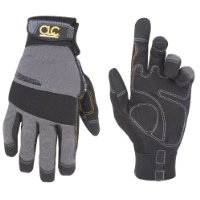 It’s hard to beat a good set of leather-palmed work gloves as they find use in so many situations, from the use of hand tools like shoves and axes to gardening. Like I said at the start, for those who aren’t accustomed to daily physical labor then your hands will surely appreciate these gloves since their main purpose is to guard against abrasion and minor cuts.
It’s hard to beat a good set of leather-palmed work gloves as they find use in so many situations, from the use of hand tools like shoves and axes to gardening. Like I said at the start, for those who aren’t accustomed to daily physical labor then your hands will surely appreciate these gloves since their main purpose is to guard against abrasion and minor cuts.
While you can purchase the one-size-fits-all cowhide gloves (and you certainly should as loaners) I much prefer you purchase a good pair of form-fitted leather-palmed work gloves. You might also want a pair of rubber-coated gloves for serious gripping power.
Though you can purchase these online the best place to purchase these gloves is at your local hardware store so that you can try them on. There are many different styles, sizes, and feels that you really need to try them on first. I suggest each adult have at leat one good pair of form-fitted gloves at home, a few loaner one-size-fits-all, and probably one good pair of form-fitted gloves in their bug out bag and vehicle kits. Of course, gloves don’t last forever so it wouldn’t hurt to purchase more than one pair if you can afford them.
Disposable Exam Gloves
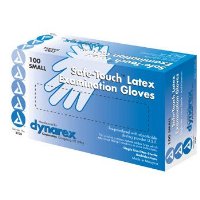 There are actually a few types of disposable gloves to consider but for most purposes the ones you want are simple disposable latex-free exam gloves.
There are actually a few types of disposable gloves to consider but for most purposes the ones you want are simple disposable latex-free exam gloves.
By and large the purpose of these gloves is to protect both you and patient from transmitting communicable diseases to and from each other. There are other uses such as to keep your hands clean while cleaning, using bleach, oiling stuff, or for whatever reason you might find use so long as you’re not dealing with harsh chemicals that would require better protection. Remember, these are for minimial protection only.
Fortunately, you can purchase these in bulk so it’s not a huge drain on the wallet. And understand that you want latex-free gloves because some people are allergic to latex. I like to keep a few to several pairs of these gloves readily available in our bug out bags and vehicle kits as well as plenty at home.
Winter Gloves
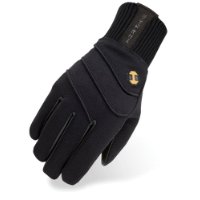 As with the leather gloves mentioned above, there are so many manufacturers, styles, sizes and materials of winter gloves that you really need to try them on before buying. In this case, visit your local sporting goods stores and spend some time there. Again, my recommendation is that each adult have one good pair at home and in your bug out bag and/or vehicle kits. If you want to save some money buy two pair and place one in your bug out bag and one in your vehicle kit.
As with the leather gloves mentioned above, there are so many manufacturers, styles, sizes and materials of winter gloves that you really need to try them on before buying. In this case, visit your local sporting goods stores and spend some time there. Again, my recommendation is that each adult have one good pair at home and in your bug out bag and/or vehicle kits. If you want to save some money buy two pair and place one in your bug out bag and one in your vehicle kit.
Mittens are another option and, in some cases (such as with children), a better one. I prefer gloves but don’t discount snow mittens for adults too.
Though hardly a substitute, you might also find that a simple set of cotton-lined gloves underneath are a great addition to any winter gloves or mittens you choose.
Chemical Gloves
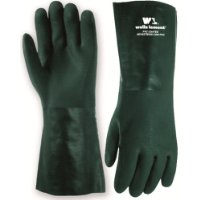 This is where it can get overwhelming. There are a variety of chemical gloves that you can and should have, including PVC-coated, nitrile, and neoprene to name the most important, in my opinion. There are others and if you want a nice chart that discusses the different types of gloves, their use, and chemical-by-chemical how each type of glove fares, reference this Glove Selection Guideline.
This is where it can get overwhelming. There are a variety of chemical gloves that you can and should have, including PVC-coated, nitrile, and neoprene to name the most important, in my opinion. There are others and if you want a nice chart that discusses the different types of gloves, their use, and chemical-by-chemical how each type of glove fares, reference this Glove Selection Guideline.
While I wouldn’t expect you to need this type of gloves while out and about, at least one or two pairs of each types of gloves is a good start to keep at home. You might also consider full-arm length gloves if you expect to be working with serious chemicals. And, of course, any additional protection required such as eye protection, aprons, etc.
For less serious chemicals–such as for basic cleaning jobs–consider reusable rubber gloves. I mentioned above that you could use simple disposable gloves for this purpose but rubber gloves might be the better option.
High Heat Gloves
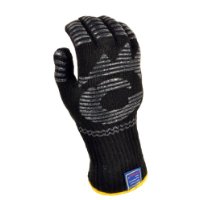 Though I have a few of the basic pairs of fireplace gloves, if I ever fined any “extra” money I’m going to upgrade to a nice pair of form-fitted heat-resistant gloves. After all, they just look cool. 😉
Though I have a few of the basic pairs of fireplace gloves, if I ever fined any “extra” money I’m going to upgrade to a nice pair of form-fitted heat-resistant gloves. After all, they just look cool. 😉
While meant for dealing with fireplace and BBQ grill heats, you could use them as oven gloves too, including handling dutch ovens and more. If you don’t have a fireplace or BBQ grill but still need heat protection then you could always buy something like an ove-glove.
There are also a number of other specialized gloves that you could purchase, inculding basic gardening gloves, welding gloves, chainsaw gloves, and more… I’m sure that if you’re into that stuff then you already know what you need.
So, what did I miss? Let me know!

Leave a Reply